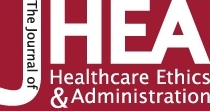Current Issue: Vol.11 No.2 (Spring 2025)
ISSN 2474-2309
HEALTH ORGANIZATION AND ETHICS
Pages: 1-7
In this paper, I delve into the moral challenges facing the American healthcare system, recently highlighted by the tragic murder of UnitedHealthcare CEO Brian Thompson. Through the lens of moral economy, I discuss how the profit-driven nature of healthcare organizations often overshadows the fundamental purpose of patient care, sparking public outrage and demands for change. Recognizing the need for a shift, this paper emphasizes how healthcare management education (healthcare administration education, interchangeably) can play a pivotal role in shaping future leaders. By integrating moral economy principles into curricula, we can better prepare students to navigate the complex healthcare landscape with integrity and compassion. I propose several approachable teaching strategies, such as using real-world case studies to illustrate ethical dilemmas, fostering empathy through community partnerships, and encouraging open discussions about corporate responsibilities in healthcare. By adopting these practices, educators can inspire students to advocate for a healthcare system that prioritizes compassion, fairness, and accountability. Ultimately, this paper calls for a renewed commitment within healthcare management education to uphold the moral obligations intrinsic to the profession. By doing so, we can reinforce the commitment to healing and service that lies at the heart of the commonwealth, empowering the next generation of healthcare leaders to effect meaningful change.
RESEARCH ETHICS
- Harshil Patel, Fredy J. Abboud, Peter A. Clark, Shikha Patel, Kreena Patel, Jeremy Muhr, Benjamin Gabrieliants, Andren Chen, Dominic Zaffino, Jose Dubon
Pages: 8-21
For more than a decade, cities struck with substance-use disorder have experienced the brunt of clandestinely adulterated drugs circulating the streets, culminating in the tragic death of over 107,000 individuals by drug-overdose in the United States in 2022. Recently, those cities, particularly Philadelphia, have witnessed a new “wave” of drug-adulterants entering the illicit drug supply. In May 2024, medetomidine, a non-opioid sedative employed in veterinary medicine, was identified as a new drug-contaminant in Philadelphia, with most identified medetomidine being co-detected with either fentanyl or xylazine. Medetomidine’s long-term effects on humans remain unknown, as concerns of a worsening illicit substance-use epidemic grow. Given such fears, this article serves to briefly educate readers on the current pharmacological and medical knowledge of medetomidine and its possible ramifications on the illicit substance-use epidemic, to offer recommendations to combat the early spread of the drug, and to ground our recommendations in ethics.
